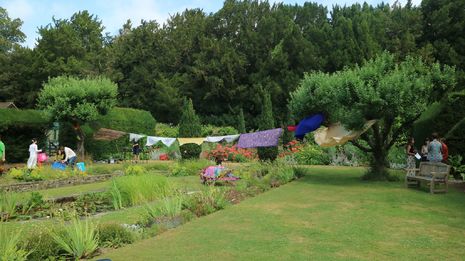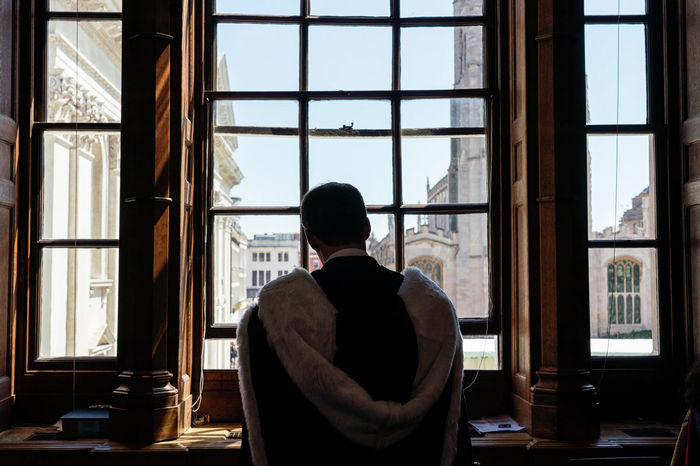Inside Clare’s campy Midsummer Night’s Dream
Daisy Bates talks Shakespeare, kazoos, and collective nostalgia with co-directors Matti Breje and Emily Megoran

If one thing’s for certain about a Clare Actors project, it’s bound to be a bit silly. Following last year’s production of The Two Gentlemen of Verona, set during a DofE expedition, I was eager to see whether co-directors Matti Braje and Emily Megoran would embrace the society’s reputation, or rebel against it. This year, I sit and watch Emily tell the excited cast that Bottom will have a kazoo. It’s safe to say, this Midsummer Night’s Dream will be a fun one.
It’s difficult to write about the annual Clare May Week show without mentioning its location. In full bloom, the sunken gardens are beautiful, centred around a focal pond that actors must work to avoid falling into. “We really wanted to do it in the round,” Matti tells me, but the practicality of staging that for a seated audience made it too tricky. I get the impression that this is a production unfolding as it goes, and that both directors are content to go with the proverbial flow, even when it contradicts their plans. Mid-way through their outdoor rehearsal, it begins to pelt down with rain. I dash for cover with my laptop, while the rehearsal continues undeterred. “It’ll pass! It’ll pass,” says Matti.
“It’s definitely a campy production”
Despite initial plans to gender-swap the four lovers, Emily confides that “it was always very dependent on the actors, and as we auditioned people, we saw a really beautiful Helena-Hermia dynamic unfold, which we wanted to bring out. We spent so much time trying to figure out how we could still have Helena and Hermia and swap something else.” “I kept drawing diagrams,” Matti interjects, “heterosexual graphs of what kind of mess we could make. In terms of gayness, it’s definitely a campy production.”
The directors are first to admit that their decision to double several characters is not particularly novel – as Emily stresses, “lots of productions have done it.” Yet, when staging a play so pre-occupied with the duality of dream and reality, “understanding the disconnect between yourself as a dreamer and a real person by having two characters represent bits of themselves in different contexts…it makes a lot of sense.”
“It’s so human to say ‘I’m just going to give it another shot’”
I ask Emily which characters they chose to double, and what impact they hope it’ll have on the audience. She puts their choice to pair Oberon and Theseus down to their tendency to “just kind of hate on Demetrius. It’s nice to see those impulses in the repressed space of Athens and then feel the continuity of them getting imploded and going a bit crazy in the woods, and then to make that connection between the two.”
Exploring the links between characters is something both directors find integral to this production, and to staging Shakespeare on the whole. “So much of this play is about theatre, about a group of people trying to put a play together,” says Matti. Re-interpreting the line “give me your hands, if we be friends,” this production ends with a whole-cast cèilidh, set to music arranged and composed by Hong-Nam Vo, which is planned to expand to include the audience. Emily acknowledges that “there’s a lot of weight to doing Shakespeare, carrying the baggage of people who’ve done it before. But that’s also the beautiful part. We have this piece of language that someone has written and we pass it between us. It’s so human to say ‘I’m just going to give it another shot.’”
As this is their co-directorial debut, I ask the pair why now? Why May Week, why this play? Matti and Emily are in the same English cohort at Clare, and confess that they’ve always been “collegiately inclined.” Matti recalls how, when the sunken gardens were finished in their first year, “both of us looked at it and said ′A Midsummer Night’s Dream, that’s all it could be.’” This is a production inspired and driven by its setting, and for Emily, “the gardens have entirely shaped the way I think about this play.”
“There’s this collective nostalgia about it, and a lot of the impetus of the play is about shared experience”
Whether or not the sunken gardens will have a similar impact on audiences remains to be seen, but the importance of location is certainly stressed within Shakespeare’s writing. Matti recalls a rehearsal with Egeus’ actor, James Schute, where they considered the location of the power in the Athenian scenes. “Egeus says ‘I beg the ancient privilege of Athens,’ and you have ‘the sharp Athenian law’ from Lysander, and as much as it looks like Theseus is the one exerting his sexual and aristocratic power, a lot of it is to do with the location. It’s like that agency is given over to how we’re shaped by our surroundings.”
Perhaps because the three of us study English, our discussion often veers back to the text. I haven’t read the play since studying it in primary school, and they tell me this was a trend among auditionees. “There’s this collective nostalgia about it, and a lot of the impetus of the play is about shared experience – it’s about emerging into desire and what’s possible in the woods. It’s a chaotic cultural memory.” I ask what, if anything, directing the play has taught them. Emily notes that “there’s something very powerful about what happens when language sits with you for a long time. You don’t just read it and put it away, the same words are in your consciousness for weeks. The play has this emphasis on ‘all shall be well,’ the idea that everything gets messed around, but it’ll be okay. It’s good to hear.”
A Midsummer Night’s Dream is showing at Clare College Fellow’s Garden from Wednesday 25th to Friday 27th June at 3:00 pm.
 News / Judge Business School advisor resigns over Epstein and Andrew links18 February 2026
News / Judge Business School advisor resigns over Epstein and Andrew links18 February 2026 News / Gov grants £36m to Cambridge supercomputer17 February 2026
News / Gov grants £36m to Cambridge supercomputer17 February 2026 News / Union speakers condemn ‘hateful’ Katie Hopkins speech14 February 2026
News / Union speakers condemn ‘hateful’ Katie Hopkins speech14 February 2026 News / CUCA members attend Reform rally in London20 February 2026
News / CUCA members attend Reform rally in London20 February 2026 News / Right-wing billionaire Peter Thiel gives ‘antichrist’ lecture in Cambridge6 February 2026
News / Right-wing billionaire Peter Thiel gives ‘antichrist’ lecture in Cambridge6 February 2026










